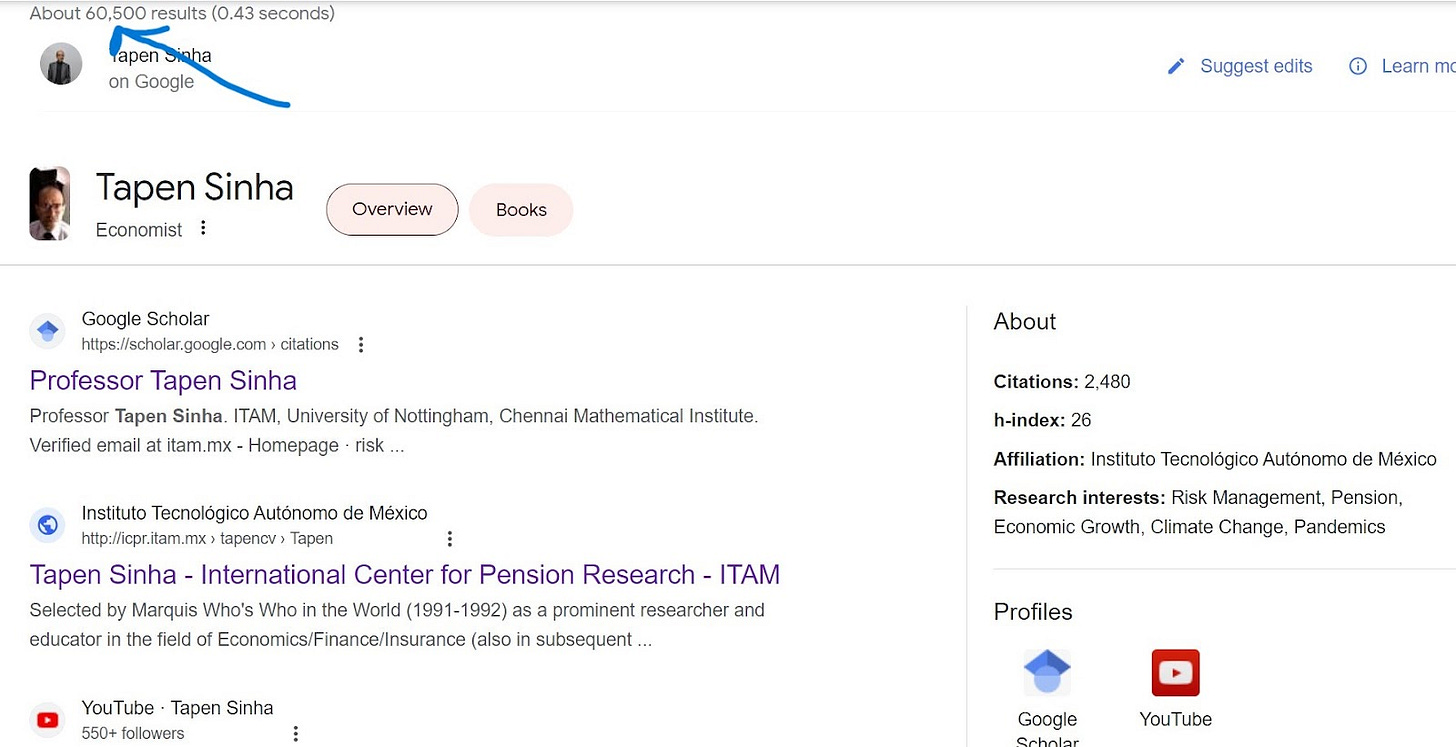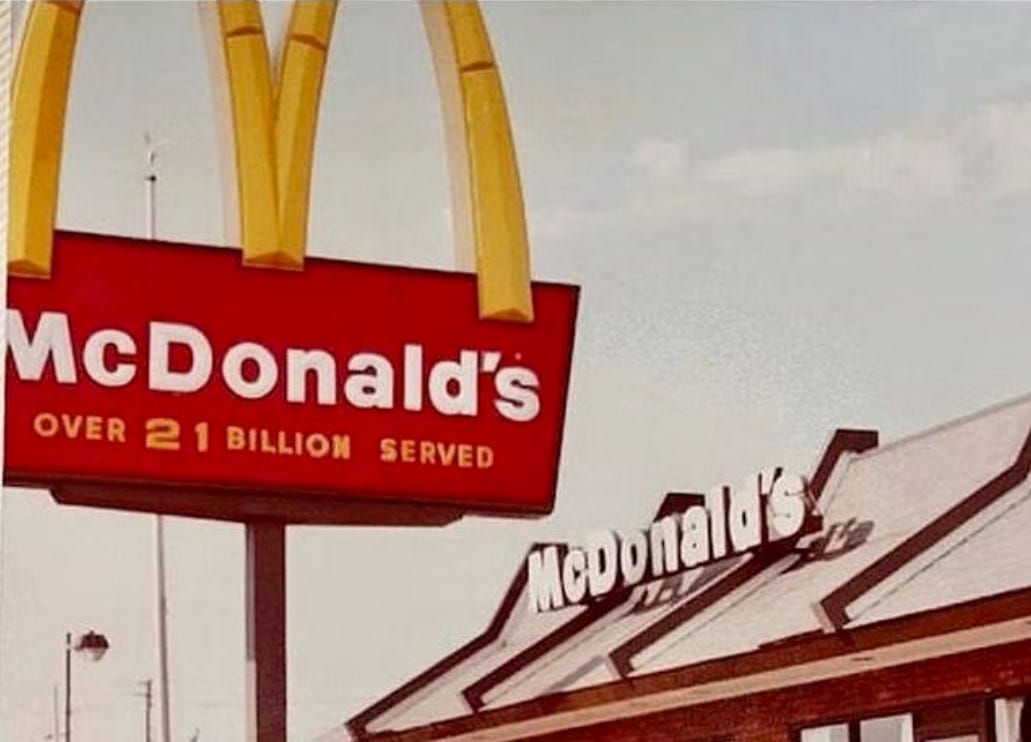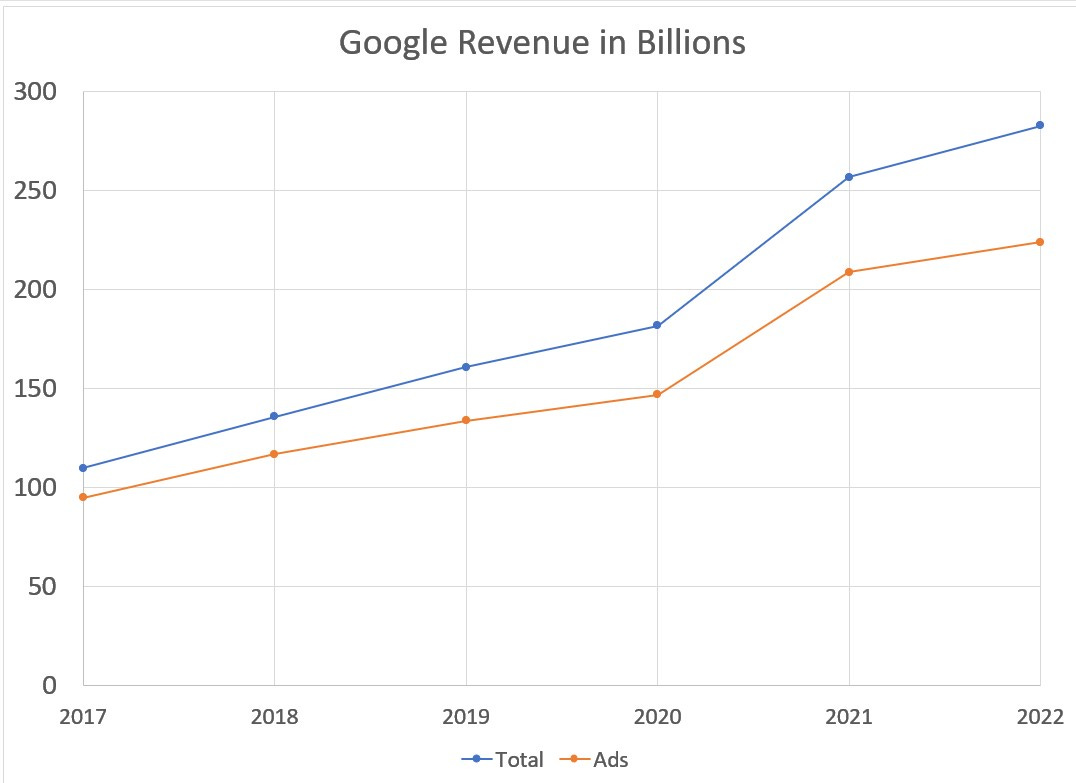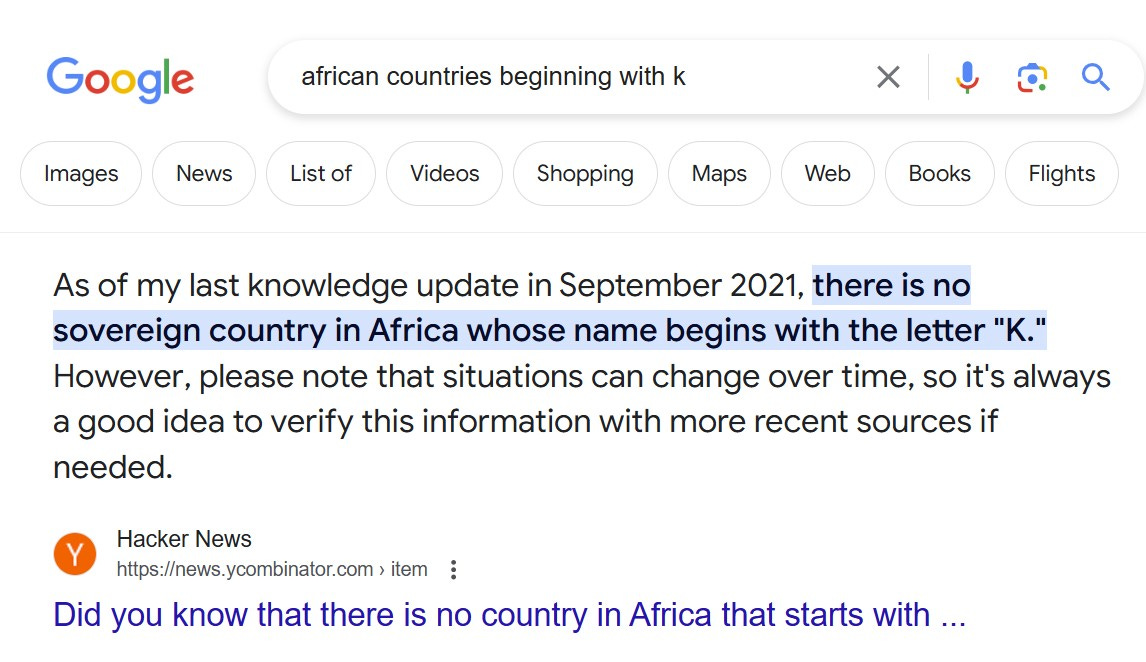Why Google Search is getting worse
“Advertising income often provides an incentive to provide poor quality search results.”
Searching for yourself [in the early days]
I have been interested in searching on the internet long before the rise of the World Wide Web. I wrote lyrically about how searches can be conducted where physical distance did not matter (in 1994).
http://icpr.itam.mx/papers/SinhaGopher.pdf
I have been searching for myself for 35 years. This is not a metaphysical question in the age of the internet. It is real. I have been searching for my name since the Altavista days. It would take weeks before the internet robot will find your name and include it in their index.
Then it turned out that you could *feed* your name to the robot and speed up the process. Then I discovered that if you put your name on each page in a powerpoint presentation by cutting it up each page as a pdf file, you can multiply your hits!
Then I discovered that you can cover your tracks by putting in your name in white with the white background so no human can see your name but the machine can.
Then I found out that you can increase the visibility of your page by putting famous names in white against white pages. Talk about whitewashing!
Those days are gone. Now the energetic search engines are detecting small changes in all the indexed pages in days rather than in months. And if you have aligned yourself to renowned webpage generators, you are in business within hours if not minutes.
Where is Google?
Google Search has changed the vocabulary of searching - figuratively and literally. And I mean literally. “Googling” is a verb now.
The Oxford English Dictionary included Google as a transitive verb on June 15, 2006 and the Merriam-Webster Dictionary followed suit in July 2006.
Google (the company) was very happy with that. They were very unhappy with the phrase: “Ungooglable”. Objections from Google have forced the removal of the word "ungoogleable" from a list of new Swedish words, the Language Council of Sweden says. https://www.bbc.com/news/world-europe-21944834]
How important *is* Google?
A recent paper shows how important Google Searches are in the life of the users. With a reasonably large (over 40,000) global sample, they find the users valuing Google Search higher than meeting friends - on the average. [See Figure 1 below]
[Source: https://www.nber.org/system/files/working_papers/w31670/w31670.pdf]
What do I get when I search for myself?
In January 2024, I got this result:
Note the number of results Google found just above that arrow.
Again, I searched for my name in May 2024. I got:
Notice that on the top left, there is no mention of the number of results.
Google.Has.Stopped.Reporting.It
Not just for my name but for *all* searches.
This is what I would call the McDonaldization of Google. Early after Ray Kroc became the CEO (he is the guy in the photo), he would make an announcement.
Later, they would count the billions.
[A bit of history: McDonald’s began announcing the number of hamburgers sold in 1958, when it claimed to have sold 100 million burgers. Five years later, in 1963, it passed the one billion mark. They went over 5 billion in 1969, and 50 billion in 1974. By 1994, they reached the 100 billion level — and they stopped counting. Going forward, the signs outside McDonald’s simply stated: “Billions and billions served.” Today, it says nothing at all.]
In 25 years, Google has reached that McDonaldization stage.
Google - Under the Hood
There has been a fundamental change in their search procedure. Google has produced some explanation of sorts: Generative AI in Search (SGE)
Executive summary: It used to search lexically. Now it searches by semantics
In Google jargon, it has gone from E-A-T (Expertise, Authoritativeness, and Trustworthiness) to E-E-A-T (Experience, Expertise, Authoritativeness, and Trustworthiness). In this process, it takes a probabilistic leap to connect otherwise tenuous connections.
Executive Result: Google Search is blunter because low probability events now do not get pruned.
It is also losing the time stamp it carries for more recent events. It used to be that I could search for my name with an upper and lower bound of DDMMYY and even sharper scales with hours, minutes and seconds. For recent events, Google seems to be losing those time stamps. However, for the distant past, Google still carries them. It is suffering from the same disease that old people are afflicted with: They remember the distant past vividly but not the recent ones.
Why is Google Search trading sharpness for bluntness?
The answer lies in its revenue model. Most searches are vague. And vague searches means people linger on the search engine longer (in the jargon, less “bounce”). That means more eyeballs for the ad it shows on the sidebars. More ads, more revenue.
Google’s main source of revenue is still from the ads. Five years ago, it was 85 percent of the total. Now it is 79 percent of the total. Google, for its survival, has to protect the ad revenue. 227 billion dollars in 2022 is not a small sum. We cannot expect Google to move away from its current strategy of incorporating vagueness to maximize revenue.
This brings me to the quote in my subtitle: “Advertising income often provides an incentive to provide poor quality search results.”
This quote is 25 years old. It was written by none other than Sergey Brin and Lawrence Page.
https://storage.googleapis.com/gweb-research2023-media/pubtools/pdf/334.pdf
Ironic.
When Google went commercial, the founders toyed with two revenue models: Subscription based or advertising based. Eventually it settled on an advertising based model. However, it only displays ads for just 20 percent of the searches. The other 80 percent have no ad at all. Twenty percent of ads generate eighty percent of Google’s revenue.
[Executive side observation: 80-20 rule - rules. It is really a manifestation of the Pareto Principle.]
Executive fact staring us: Ads fund Google.
Google also dominates the browser market with Chrome.
Executive recommendation: Always use Chrome for browsing.
Why?
Google spends a huge amount of resources on Chrome. The reason is simple: Without Chrome, it will not be able to dominate the search market that generates most of its revenue. By using Chrome, we can ride on the effort by Google to keep Chrome from viruses, files with payload to infect your device. Other browsers do not have that much at stake. For example, Apple Safari has 18 percent of the browsing market. But, very little revenue for Apple comes from searches.
Executive result: Other companies do not have such a stake in the browser market than Google does.
Executive Hard Truth: For the “free” service, Google has been very useful. But, its latest tango with AI has been less than stellar.
Current Clear Air Turbulence (CAT) for Google
When I searched for African countries beginning with K, it showed the following:
You wouldn’t expect Google to miss Kenya.
But it did.
Why is it making this kind of elementary mistake?
To understand the mechanics, we have to examine how Google is incorporating *new* information these days. Recently, it is scraping data from Reddit.com. As a result, reddit hits have skyrocketed. Reddit is also showing up at the top of Google searches. Remember, all search engines use exponential decay formulas - old results are buried and new results are highlighted. Reddit is a strange beast. It is populated by tiny communities that cater to niche obscure information. [It is full of kinky groups.] More than 70 percent of reddit users are males under the age of 30. As we know, this population is a fertile ground for conspiracy theorists - generally it is the home of wrong information (did anybody say flat earther? They are there too). By putting more weight on reddit entries, Google is propagating incorrect information - big time.
Executive question: Will it correct itself?
Executive answer: I would like to reiterate what Chinese Premier Zhou Enlai purportedly declared in 1971 about the significance of the French Revolution of 1789: “Too soon to tell.” To be fair, he might have thought the question was about the 1968 student unrest in France. But the phrase has become the meme of all memes.










